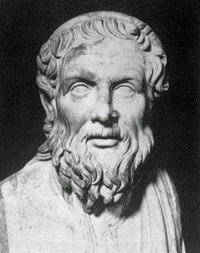Apollonius of Rhodes

Apollonius of Rhodes (c. 295–215 BC) was an ancient Greek poet and scholar. He worked at the Library of Alexandria. Only excerpts of his epigrams and small epic poems have been preserved. Only Argonautica has survived fully. It is a monumental poem and is based on the myth of the Argonauts. The poem consists of four books (songs), contains 5,835 lines, and describes in detail the campaign to Aeaea-Colchis with Jason in the lead to find the Golden Fleece. Apollonius of Rhodes followed in the footsteps of the ancient Hellenic heroic poetry. He used Homer's artistic techniques and directly imitated Odyssey in many cases. Argonautica is overloaded with detailed descriptions of objects and events, literary passages, myths, genealogies and geographical and ethnographic references. Creative innovation is manifested in the third song. In this song, the action takes place in ancient Colchis, in the palace of King Aeetes. The spiritual struggle of Medea, the king's daughter, when she sacrificed her homeland for her lover, is depicted with great artistic power.
Apollonius of Rhodes was one of the first poets who expanded the framework of epos and thereby contributed to the foundation of the Greek novel. These characteristics and other merits put the poem among the masterpieces of world literature. Argonautica had a great success in ancient Greece. Its short version was also created there.
The poem contains a lot of important information about ancient Georgian tribes — Chalybes, Tibareni, Mossynoeci; There is information about Kutaisi, the description of Colchis (Aeaea), interesting stories about the Golden Fleece and bulls with copper hooves, information about hospitality and other customs in the poem.
Literary work: არგონავტიკა (თარგმ., წინასიტყვ. და განმარტ. აკ. ურუშაძისა), თბ., 1970.
Literature: უ რ უ შ ა ძ ე ა., ძველი კოლხეთი არგონავტების თქმულებაში, თბ., 1964; ყაუხჩიშვილი ს., ბერძნული ლიტერატურის ისტორია, ტ. 2, თბ., 1949.
A. Urushadze


